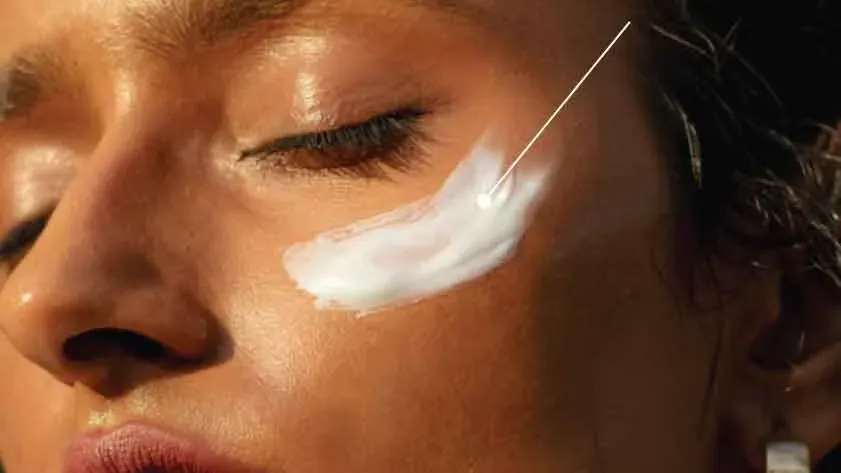Discover the Secret to Glowing Skin with Sunscreen as a Moisturizer


Skincare is an essential part of our daily routine, and maintaining healthy skin is something we should all prioritize. One of the key components of skincare is protecting our skin from the harmful effects of the sun's UV rays. This is where sunscreen comes in. Not only does it shield our skin from sun damage, but it can also double up as a moisturizer, providing hydration and nourishment. In this blog post, we will explore the benefits of using sunscreen as a moisturizer and debunk common myths surrounding this multi-action product.
1. Hydration and moisturization properties of sunscreen
Many sunscreens on the market today contain hydrating ingredients such as hyaluronic acid and glycerin. These ingredients help to lock in moisture and keep your skin hydrated throughout the day. By using sunscreen as a moisturizer, you can simplify your skincare routine and save time and money.
2. Protection against sun damage and premature aging
Sunscreen is known for its ability to protect the skin from harmful UV rays, which can lead to sunburn, premature aging, and even skin cancer. By using sunscreen as a moisturizer, you are not only hydrating your skin but also providing it with the necessary protection it needs to stay healthy and youthful-looking.
3. Prevention of skin cancer and sunburns
Regular use of sunscreen has been proven to reduce the risk of developing skin cancer. By incorporating sunscreen into your daily skincare routine, you are taking a proactive step towards preventing this deadly disease. Additionally, sunscreen helps to prevent sunburns, which can be painful and damaging to the skin.
1. Chemical sunscreens with moisturizing ingredients
Chemical sunscreens, such as avobenzone and octocrylene, work by absorbing UV rays and converting them into heat. Many of these chemical sunscreens also contain moisturizing ingredients like aloe vera and shea butter, which provide hydration and nourishment to the skin.
2. Physical sunscreens with hydrating properties
Physical sunscreens, containing zinc oxide or titanium dioxide, work by creating a physical barrier on the skin that reflects and scatters UV rays. Some physical sunscreens also contain hydrating ingredients like ceramides and niacinamide, which help to keep the skin moisturized.
3. Combination sunscreens that offer both sun protection and hydration
There are also combination sunscreens available in the market that offer both sun protection and hydration. These sunscreens often contain a mix of chemical and physical sunscreen ingredients, along with moisturizing components like hyaluronic acid and vitamin E.
1. Choosing the right SPF level for your skin type
It's important to choose a sunscreen with the appropriate SPF level for your skin type. SPF 30 is generally recommended for everyday use, but if you have fair or sensitive skin, you may want to opt for a higher SPF level.
2. Applying sunscreen correctly for maximum benefits
To ensure maximum effectiveness, apply sunscreen generously and evenly to all exposed areas of the skin. Don't forget to apply it to often overlooked areas like the ears, neck, and hands. Reapply every two hours or more frequently if you are sweating or swimming.
3. Incorporating sunscreen into your daily skincare routine
Make sunscreen a part of your daily skincare routine by applying it as the last step before makeup or moisturizer. This will ensure that your skin is protected throughout the day, even if you are not spending much time outdoors.
1. Addressing concerns about clogged pores and breakouts
Some people worry that using sunscreen as a moisturizer can clog their pores and lead to breakouts. However, many sunscreens today are non-comedogenic, meaning they won't clog your pores. Look for oil-free or lightweight formulations if you have oily or acne-prone skin.
2. Clarifying misconceptions about sunscreen's effectiveness as a moisturizer
There is a misconception that sunscreen cannot provide adequate hydration for the skin. However, as we discussed earlier, many sunscreens contain moisturizing ingredients that help to keep the skin hydrated. Using sunscreen as a moisturizer can be a convenient and effective way to nourish and protect your skin at the same time.
Introducing our latest multi-action sunscreen with SPF 50 PA+++. This innovative product not only provides superior sun protection but also acts as a moisturizer and glow-booster. Its lightweight formula absorbs quickly into the skin, leaving it hydrated and radiant.

Key ingredients:
With this multi-action sunscreen, you can simplify your skincare routine and achieve glowing, healthy-looking skin in one easy step. Say goodbye to dull and dehydrated skin, and hello to a radiant complexion!
1. Incorporating other skincare products and routines
Apart from sunscreen, it's important to incorporate other skincare products and routines into your daily regimen. Cleansing, toning, and moisturizing are essential steps that help to keep your skin clean, balanced, and hydrated.
2. Maintaining a healthy lifestyle and diet
Healthy skin starts from within. Make sure to drink plenty of water, eat a balanced diet rich in fruits and vegetables, and get enough sleep. Avoid smoking and excessive alcohol consumption, as these can have negative effects on your skin.
3. Seeking professional advice and regular skin check-ups
If you have specific skincare concerns or are unsure about the best products for your skin type, it's always a good idea to consult a dermatologist. They can provide personalized advice and recommend treatments or products that will work best for you. Additionally, regular skin check-ups can help to detect any potential issues early on and prevent further damage.
Inspired by the benefits and convenience of using sunscreen as a moisturizer, we encourage you to prioritize skincare and protect your skin with sunscreen and other skincare practices. Remember, healthy and glowing skin is achievable with the right products and routines. Start incorporating sunscreen as a moisturizer into your daily regimen and see the difference it can make for your skin!